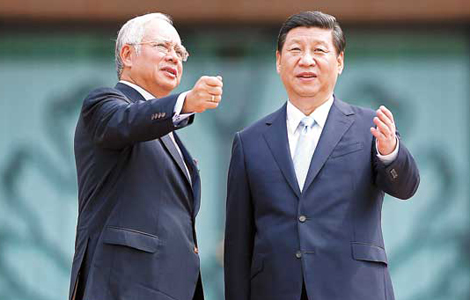Mutual help the best: IMF chief
Updated: 2013-10-04 12:15
By Chen Weihua in Washington (China Daily)
|
||||||||
The chief of the International Monetary Fund sees both warning and encouraging signs in the ongoing Chinese economic transition.
Christine Lagarde, the IMF managing director, said China needs to keep on moving to a growth path that is based less on credit growth and more on higher productivity, high incomes and higher consumption, citing the country's high credit to GDP ratio of 180 percent so far this year.
"That means liberalizing interest rates, that means ramping up financial sector oversight, opening up protected sectors to private initiatives, and further strengthening the social safety net," Lagarde said on Thursday at George Washington University, adjacent to the IMF building, in Washington DC.
She also warned about the risks posed in the US and China by the shadow banking system - non-banking financial intermediaries that provide services similar to traditional commercial banks'.
While the nonbanking sector in the US is now twice the size of the banking sector, half of the new credit that is issued this year in China has been extended through the shadow banking system.
Lagarde said she is not suggesting an elimination of shadow banking, which she said "can be helpful". "But it needs to be made a lot more transparent and it needs more oversight," she said.
The French woman, however, saw some interesting signs in China lately and she told the audience to pay attention to the Shanghai Free Trade Zone (FTZ).
Officially launched by China's State Council on Sept 27, the 28-square-kilometer FTZ in Shanghai's Pudong New Area is a testing ground for many new critical policies, such as financial innovation, interest liberalization and full-capital account convertibility, before they are expanded into the whole financial system.
Describing the zone as "a new initiative" and "very interesting to watch", Lagarde said a lot of the financial reforms she mentioned might happen there.
"It's not a huge zone and it's quite restricted in geographic terms, but the degree of freedom and the liberalization that is announced would certainly entice investors," she said.
Nicholas Borst, research associate and China program manager at the Peterson Institute for International Economics, called the Shanghai FTZ the most exciting reform announcement since the Xi Jinping-Li Keqiang government came into office. "The experiments conducted within this zone over the next several years will have a significant influence on the future shape of financial reform," Borst said.
Despite her concern for China's high credit to GDP ratio, Lagarde said she welcomed the Chinese monetary authority's efforts to rein in the credit growth to avoid the risks of the boom and bust, particularly in the real estate sector.
Nicholas Lardy, a senior fellow at the Peterson Institute, pointed out that risks from China's overinvestment in property are still accumulating.
"The widely anticipated third plenary of the Chinese Communist Party's 18th Congress next month should endorse further economic reform which I hope will accelerate the pace of rebalancing over the pace we have seen in the past couple of years," Lardy said on Tuesday.
China has been making efforts to change its growth model driven by investment to one driven by consumption.
To Lardy, interest rate liberalization, fiscal policy such as asking State-owned enterprises to pay more taxes, and a substantial increase in government spending on a social safety net should be on top reform agenda.
He believes the Chinese economy will continue to grow in the 7-to-8 percent range for a number of years and is not sliding to 3-4 percent as some predicted. He also described the current Chinese economic slowdown as "indigenous", and driven largely by policies to reduce infrastructure investment and housing investment over the past years.
He does not think that the US Federal Reserve's tapering, an end of easy money, will have a strong impact on China as on other emerging markets, citing China's continuous current account surplus, its status as the world's second-largest creditor country, its firm international investment position and relatively small inflow of hot money.
Lagarde warned the US to be careful in managing its exit from the stimulus program.
"Because the transition of the monetary policy into a more traditional role will not only affect the US market, but also other markets around the world, so in our view, it has to be done gradually, it has to be done with good communication and hopefully in a dialogue with other central bankers and policy makers," said the 57-year-old former French politician and lawyer who took the current job in 2011.
She said the international community faces a common challenge to make sure that all can gain from globalization and prosper in the increasingly interconnected world.
"This can only be done if countries work together, sincere in the belief that mutual help is the best form of self help," she said.
chenweihua@chinadailyusa.com
(China Daily USA 10/04/2013 page1)

 Buddhist Art at the gateway of the Silk Road
Buddhist Art at the gateway of the Silk Road Embracing innovation
Embracing innovation
 Search for a cup holder's identity
Search for a cup holder's identity
 China and Malaysia set blueprint to boost ties
China and Malaysia set blueprint to boost ties
 A holiday without much fun
A holiday without much fun
 Driver shot dead in car chase at US Capitol
Driver shot dead in car chase at US Capitol
 NY SUV driver's wife: We were in 'grave danger'
NY SUV driver's wife: We were in 'grave danger'
 Death toll in sunk boat off Italy could top 200
Death toll in sunk boat off Italy could top 200
Most Viewed
Editor's Picks

|

|

|

|

|

|
Today's Top News
UN aviation body reaches deal on carbon emissions
Republicans hang tough in standoff over shutdown
Italy's senate panel votes Berlusconi's expulsion
ZTE aims at bigger share in neighbors
Li's East Asian visit will boost co-op
Gunshots fired near US Capitol
Orange alert as typhoon nears
US military conducts missile defense test
US Weekly

|

|





